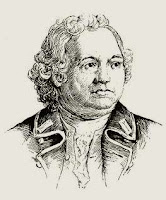“To turn his back sullenly on his General”?
Trumbull asked Gen. George Washington to understand how Spencer was miffed at seeing Israel Putnam promoted to major general over him. And merely because Putnam had led troops in the Battle of Chelsea Creek.
Delivering that letter was probably the first time Spencer had met Washington. And I imagine the discussion was as stiff and cold as the new commander-in-chief could be. As Maj. Samuel Blachley Webb (shown here) wrote on 11 July, Spencer’s departure “without leave or license from Gen. Washington,…displeased him much.”
Indeed, Spencer’s hissy fit had damaged his standing even among his own officers. He’d asked his subordinates to sign a protest on his behalf, and Webb reported:
I have since been to Roxbury, and find the officers, many of them, heartily sick of what they have done, in particular, Maj. [Return Jonathan] Meiggs,—who says he was forced to sign what the others did—to keep peace; and says he had rather serve under Putnam than Spencer.News of Putnam’s higher rank “gave universal satisfaction,” Webb added.
You’ll find Generals Washington and [Charles] Lee, are vastly more fond, and think higher of Putnam, than any man in the army; and he truly is the Hero of the day. . . . Better is it for us to lose four Spencers than half a Putnam.
Webb was sending these observations to his stepfather, Silas Deane. On 20 July, Deane told his wife how the Continental Congress was responding to Spencer’s behavior:
You can be at no loss to infer what opinion is formed of him from this conduct, in doors and out. Suffice it to say, the voice here is, that he acted a part inconsistent with the character either of a soldier, a patriot, or even of a common gentleman. To desert his post in an hour of danger,—to sacrifice his Country, which he certainly did as far as was in his power,—and to turn his back sullenly on his General, a General, too, of such exalted worth and character,—will, I can assure you, unless he take the most speedy and effectual measures to atone, draw upon him the resentment of the whole Continent.Neither Deane nor fellow Connecticut delegate Eliphalet Dyer ever pushed Spencer for promotion again. (He was made a major general in the fall of 1776 as part of a general wave of promotions.)
On 21 July, Gen. Washington reported to the Congress that Spencer had agreed to “serve under Puttnam, rather than leave the Army intirely.” The men’s relative ranks would not change.
The next day, Gen. Washington announced a new organization for the Continental Army around Boston. With three major generals under him, he put Artemas Ward in charge of a brigade on the southern side of the siege lines, Lee in charge of the northern wing, and Putnam in charge of the center.
Among the brigadier generals, he assigned Spencer to the southern wing under Ward. Thus, Spencer would answer to a general he’d already acknowledged as senior, not to Putnam. Gov. Trumbull had suggested a similar way of keeping the two Connecticut officers apart. Which wasn’t the sort of issue Washington wanted to face.
Spencer served the rest of the siege, making no distinct contribution at all. He never gained Washington’s trust, and after an unsuccessful Rhode Island campaign he left the army.


